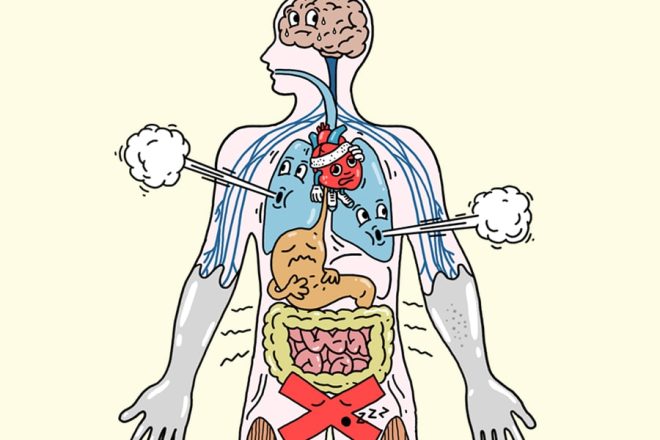
How Stress Affects Your Body
Stress, especially when it becomes chronic, can have a profound impact on your body. While short-term stress can be manageable and even beneficial in certain situations (e.g., helping you focus or perform in a high-pressure situation), long-term or chronic stress can lead to a wide range of negative physical, mental, and emotional health issues. Here’s how stress affects different systems in your body:
Nervous System
- Fight-or-Flight Response: When you experience stress, your body activates the sympathetic nervous system, triggering the “fight-or-flight” response. This releases stress hormones like adrenaline and cortisol, preparing your body to react to a perceived threat. In the short term, this can be beneficial, but chronic stress keeps these systems on high alert, leading to overstimulation of the nervous system.
- Mental Health: Chronic stress can contribute to anxiety, depression, irritability, and mood swings. It can also lead to difficulty concentrating or sleeping, as the constant activation of the stress response disrupts mental well-being.
Cardiovascular System
- Increased Heart Rate and Blood Pressure: Stress causes your heart rate to increase and blood vessels to constrict, raising blood pressure. Over time, this can strain the cardiovascular system, potentially leading to high blood pressure (hypertension), heart disease, or stroke.
- Risk of Heart Attack or Stroke: The prolonged high levels of cortisol and adrenaline can increase the risk of a heart attack or stroke by causing inflammation in blood vessels, raising cholesterol levels, and contributing to blood clotting.
Immune System
- Weakened Immune Function: Chronic stress suppresses the immune system, making you more susceptible to infections and illnesses. Stress reduces the production of immune cells, making it harder for your body to fight off pathogens.
- Autoimmune Conditions: Long-term stress can also trigger or exacerbate autoimmune diseases, where the immune system mistakenly attacks healthy tissues in the body, such as in conditions like rheumatoid arthritis or lupus.
Endocrine System
- Hormonal Imbalance: The body’s stress response triggers the release of cortisol, the “stress hormone.” Chronic stress can result in prolonged elevated cortisol levels, which can interfere with normal hormonal balance, affecting thyroid function, metabolism, and reproductive hormones.
- Blood Sugar Levels: Elevated cortisol levels can also lead to higher blood sugar levels, which, over time, may increase the risk of developing type 2 diabetes.
Digestive System
- Gastrointestinal Issues: Stress can interfere with digestion and lead to conditions such as heartburn, acid reflux, irritable bowel syndrome (IBS), or even ulcers. Stress causes the body to divert resources away from digestion, which can slow down or upset normal gut function.
- Appetite Changes: Some people experience a loss of appetite, while others may overeat when stressed, leading to unhealthy eating habits and weight changes. Stress eating, often referred to as “emotional eating,” can lead to overeating unhealthy foods and contribute to weight gain or unhealthy eating patterns.
Musculoskeletal System
- Muscle Tension: Stress often causes muscles to tighten and contract, leading to discomfort, headaches, neck pain, or back pain. This muscle tension is a result of the body being in a constant state of alertness.
- Chronic Pain: Over time, prolonged muscle tension and stress can contribute to chronic pain conditions, including tension headaches, migraines, and muscle stiffness.
Respiratory System
- Shortness of Breath: During periods of stress, you may experience shallow breathing or shortness of breath as a result of the body’s increased demand for oxygen. In people with asthma or other respiratory conditions, stress can exacerbate symptoms and make breathing more difficult.
- Increased Risk of Respiratory Issues: Long-term stress can lead to chronic inflammation in the respiratory system, potentially increasing the risk of respiratory infections or worsening asthma symptoms.
Skin and Hair
- Skin Problems: Chronic stress can lead to skin issues such as acne, eczema, psoriasis, or rosacea. This is often due to hormonal changes and the inflammatory response triggered by stress.
- Hair Loss: Stress can cause hair thinning or hair loss through conditions like telogen effluvium, where stress causes hair follicles to enter a resting phase prematurely, leading to shedding. Stress-related hair loss can also be associated with alopecia areata, an autoimmune disorder.
Reproductive System
- Menstrual Irregularities: For women, chronic stress can lead to irregular periods, heavier bleeding, or even missed periods. Stress can affect the hormonal signals necessary for regular ovulation, leading to fertility issues.
- Reduced Libido: High stress levels can decrease sex drive in both men and women, due to hormonal imbalances (e.g., cortisol suppressing the production of sex hormones) and the general fatigue that often accompanies chronic stress.
- Impact on Male Reproductive Health: In men, chronic stress may lower testosterone levels, impair sperm production, and affect overall reproductive health.
Sleep
- Sleep Disruptions: Stress is a common cause of insomnia, with the body’s heightened state of arousal making it difficult to relax and fall asleep. Chronic stress can lead to poor sleep quality, which in turn can affect mental clarity, mood, and overall physical health.
Weight Gain or Loss
- Stress Eating or Emotional Eating: As mentioned earlier, stress can lead to overeating or poor dietary choices, which can lead to weight gain. Alternatively, some people may lose their appetite under stress, which can lead to unhealthy weight loss.
- Fat Storage: Prolonged stress leads to high cortisol levels, which can increase fat storage, particularly around the abdomen, increasing the risk of obesity and metabolic syndrome.
